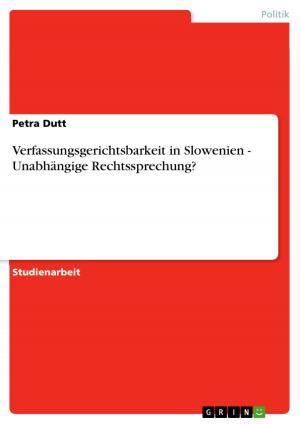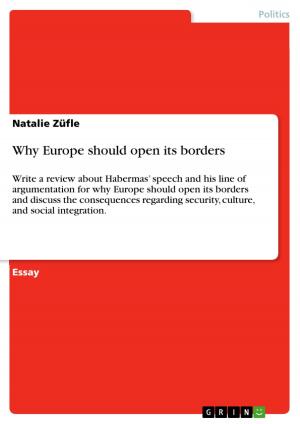Media and War on Terror
A Study of Media Propaganda and Diplomacy
Nonfiction, Social & Cultural Studies, Political Science, International, International Security| Author: | Arshi Aggarwal | ISBN: | 9783656861492 |
| Publisher: | GRIN Verlag | Publication: | December 16, 2014 |
| Imprint: | GRIN Verlag | Language: | English |
| Author: | Arshi Aggarwal |
| ISBN: | 9783656861492 |
| Publisher: | GRIN Verlag |
| Publication: | December 16, 2014 |
| Imprint: | GRIN Verlag |
| Language: | English |
Scientific Essay from the year 2013 in the subject Politics - International Politics - Topic: Peace and Conflict Studies, Security, grade: 77.0, University of Sheffield, course: Theory and Practice of International Relations, language: English, abstract: In 2012, at least 67 journalists had been killed in action in different conflict areas across the globe, making it one of the deadliest years for media persons in action (CPJ, 2012). Never before in the recorded history, have so many journalists lost their lives in conflict zone. There was a time when media in war was treated at par with Red Cross Samaritans. But, now journalists are seen as polarised agents of either side (Aday et al., 2005: 6; CPJ, 2012). Perhaps the notion has befallen as a result of increasingly state controlled and propagated media content. Several scholars have researched and argued that in contemporary era, media objectivity is almost invisible and the tactics that make it biased are hidden from masses. Although, there is no deniability in the argument that media has the power to filter certain content in specific style to get desirable response from the public, but unfortunately, it has lost majority control over making that decision. Now it is being used by the governments as a tool to generate consensus over its operations, however outrageous they might be. Researches indicate that in case of ongoing 'war on terror' media has been effectively used to create mass support for war, dehumanise enemies, create a fake sense of victory and even as a strategic method to instil positive image in hostile countries. This paper is classified as follows. The first part deals with the concepts of framing, elite and pluralist theories and propaganda model suggested by Herman and Chomsky. Second part attempts to elaborate on the various roles that media plays in the war on terror under, with a brief discussion about the counter forces acting in the information technology that may revolutionise the war reporting in future and challenge the state's control over the information flow like never before. Finally, the third section looks at how media can be used to instigate peace in conflict regions.
Scientific Essay from the year 2013 in the subject Politics - International Politics - Topic: Peace and Conflict Studies, Security, grade: 77.0, University of Sheffield, course: Theory and Practice of International Relations, language: English, abstract: In 2012, at least 67 journalists had been killed in action in different conflict areas across the globe, making it one of the deadliest years for media persons in action (CPJ, 2012). Never before in the recorded history, have so many journalists lost their lives in conflict zone. There was a time when media in war was treated at par with Red Cross Samaritans. But, now journalists are seen as polarised agents of either side (Aday et al., 2005: 6; CPJ, 2012). Perhaps the notion has befallen as a result of increasingly state controlled and propagated media content. Several scholars have researched and argued that in contemporary era, media objectivity is almost invisible and the tactics that make it biased are hidden from masses. Although, there is no deniability in the argument that media has the power to filter certain content in specific style to get desirable response from the public, but unfortunately, it has lost majority control over making that decision. Now it is being used by the governments as a tool to generate consensus over its operations, however outrageous they might be. Researches indicate that in case of ongoing 'war on terror' media has been effectively used to create mass support for war, dehumanise enemies, create a fake sense of victory and even as a strategic method to instil positive image in hostile countries. This paper is classified as follows. The first part deals with the concepts of framing, elite and pluralist theories and propaganda model suggested by Herman and Chomsky. Second part attempts to elaborate on the various roles that media plays in the war on terror under, with a brief discussion about the counter forces acting in the information technology that may revolutionise the war reporting in future and challenge the state's control over the information flow like never before. Finally, the third section looks at how media can be used to instigate peace in conflict regions.















